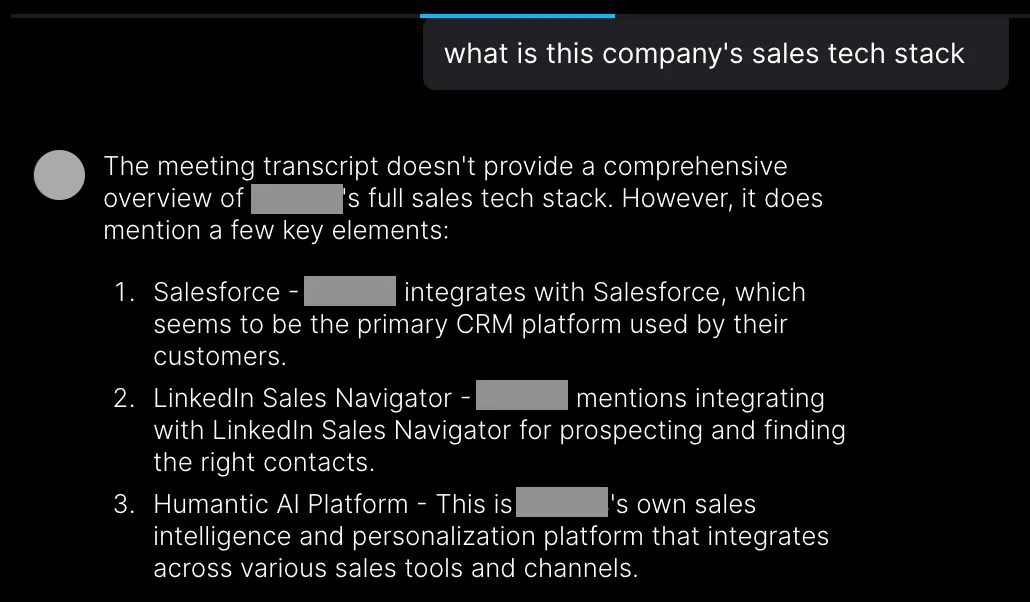Overselling AI (Sold With AI - Edition 10)
While AI can have high ROI, most vendors are overselling what is possible. At least today. This post covers some areas that one should be careful about.
Now let me start by sharing a small story.
A few weeks ago, while walking into a customer meeting, I needed to look up their current tech stack (so that I don’t have to ask them again!).
I knew it had been discussed earlier in one of the meetings, I just didn’t remember it. So I decided to ask the AI (that our call intelligence tool offers).
The result?
Crickets!
But when I looked at the summary that was generated earlier for the same meeting, the AI had clearly picked up this prospect’s tech stack. Essentially, it was failing to make the connection when the (fairly easy) question was asked in a wider context than what the AI had been taught to learn.
Another time, I needed to find a pricing proposal that one of our sales guys had sent to one of the prospects.
Instead of looking through dozens of emails (there had been heavy back and forth with this customer), I thought I will simply ask Google Gemini.
“Can you find the pricing proposal we have sent to this customer?”
Gemini’s answer? Again, crickets!
So what is my point?
My point is that often, AI is being oversold to us. Or we are overselling ourselves!
(I have written about the unnecessary hype earlier too)
Now some of this is natural. Every hot commodity gets oversold. When there is demand, supply rises to the occasion. Sometimes more than it should.
(This is not to take anything away from the potential of AI in sales. I have also written about the massive opportunities with AI earlier. But if you know me, you know by now that I advocate ‘gradual fast’ pragmatism)
So, with that said, let us get back to the topic. When it comes to Sales AI, what are some of the areas where GTM teams are likely being oversold to?
The first such area is where the vendors are making the promise of the fully autonomous AI Agent.
A.k.a the AI SDR.
I have written on this topic a couple of months ago. I have also spoken about it socially. Simply put, the technology for high quality, completely autonomous execution is not ready. Therefore, what you are left with is a poor cousin of the promise. It can do a half-decent job, and the early results are sometimes enough to get people excited. But as the early adopters have started reporting, there is a quick drop in results as soon as the AI agent starts getting throttled on the no. of contacts front (everyone has only a finite audience that matches its ICP).
And I am not even talking about the ‘Dust Bowl Effect’ - where overfarming leads to erosion of topsoil (in this case, prospect attention span) and no one comes out a winner in the longer, or even the medium, run.
The second area of overpromise is where data is being sold in the guise of AI.
I see many vendors whose product’s core functionality is data aggregation, but it is being presented to customers as AI. Even if you ignore the fact that it is misleading (and confusing), the fact remains that data inherently provides much less leverage than intelligence (or in other words, AI). In his book ‘The Sales Innovation Paradox’, Dr. Howard Dover reports an experiment that shows that ‘clean data’ (that most teams spend significant money and resources on) has only 24% pipeline impact compared to 300% for ‘intelligent personalization’ for example.
Hence the difference between what the customer expects from ‘AI’ and what they actually get from ‘data’ is vast and often underwhelms the customer.
The third such area is when automation is sold in the guise of AI. Often combined with data.
In this case, the impact can be even lesser than the impact of data. Information overload is the defining characteristic of buyer experience today and automation exacerbates that problem instead of solving it.
The fourth such area is where the vendors are promising deep research capability, or “find anything in seconds”.
I was talking to the CRO of a mid-sized startup and he was telling us how game-changing they thought Microsoft Copilot was. How they look up information in minutes that used to take tens of hours.
The problem here is hard for most people to understand. While Generative AI is great at summarizing and answering generic questions - often causing users to get excited - it is not so great at understanding specific questions. The example I shared at the start is a good example of this limitation. Anyone who has tried to use a specific image in Canva or Midjourney would be well-familiar with this effect too.
The final area where customers are being oversold is the overpromise of results.
A natural question arises. If the results are not what the vendors are promising, then are they lying?
I don’t think so. I think the reason is simply what researchers and academicians have known for a long time - that the results being reported have been measured in lab conditions - in ideal conditions. But the reality is a lot more complex, and even more convoluted. Hence it is often hard for most vendors to deliver the same results in the real world.
This is not exactly a problem related to sales AI. It has often been observed in completely unrelated areas too. For example, a group of Google researchers claimed that they had discovered two million new compounds using AI (and the whole world went gaga over it). But a later study confirmed that most of those compounds were useless or just theoretical - they did not fulfil the criteria of having novelty, credibility as well as utility, which is used as a measure to determine the worthiness of such compounds.
Beyond sales too, some skepticism related to AI is beginning to creep in. After reporting earlier that Generative AI could impact the world's GDP by 7-8%, Goldman Sachs is now saying that the impact might be less than 1%. Even Sequoia, a VC fund at the forefront of AI investments, seems concerned.
The reality is that neither the earlier exuberance, nor the recent melancholy, are warranted. We are simply going through the hype cycle, and now seem to be entering the trough of disillusionment. While there is some general overpromise when it comes to new technologies, some ideas are definitely being oversold more than they should be.
As a buyer, those are the ones that you want to be more careful about.






